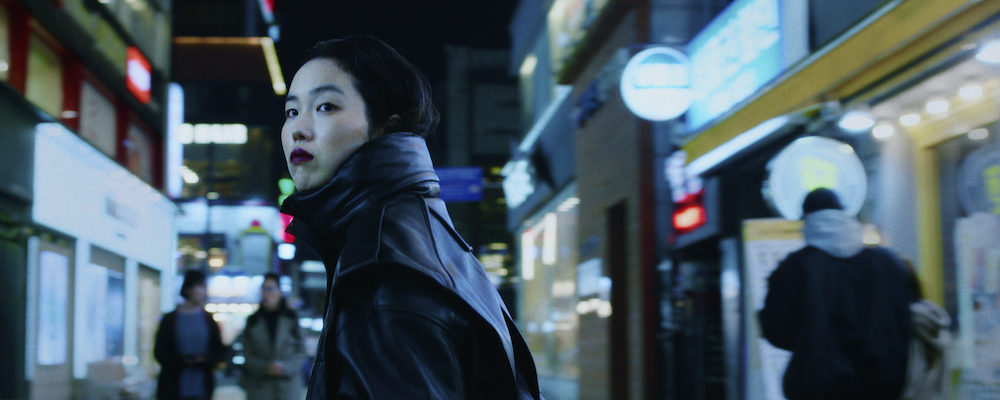‘Return to Seoul’ Forms an Exquisitely Moving Portrait of Seeking Identity
Alci Rengifo
We may identify according to ethnic labels or the geography of our birth, but for others that may not be enough to define them or a sense of home. In chapters containing subtle surprises, “Return to Seoul” follows a young French woman’s journey as she gets the chance to meet her birth parents in South Korea. This is not one of those cornball feel-good dramas where fate and chance make everything alright. Director Davy Chou has made a restless, engrossing portrait of a seeker. His lead, Park Ji-min gives a career-making performance of quiet dynamism. What she does is create a character which lacks the precise plot beats of formulaic dramas, instead stumbling and learning. Not every major question we have about our lives get answered, and sometimes when we do get an answer, it isn’t the one we want.
The story begins in Seoul, where Freddie (Ji-Min) has just made friends with two locals, Tena (Guka Han) and Dongwon (Son Seung-Beom). They discuss how Freddie is obviously Asian in ethnicity, but does not speak Korean and has been raised in France by adoptive parents. She’s also reckless when it comes to local etiquette, such as a guest never pouring their own drinks. One senses it isn’t out of sheer wildness or even youthful arrogance. Freddie is used to marching to the beat of her own drum, because she belongs nowhere and everywhere. When she visits the agency that handled her adoption, she learns the information of her birth parents is kept on file. If she wishes, a telegram can be sent to them and only if they wish to meet her, can she then proceed. First it is her biological father who responds. When Freddie sets out to meet him, it is only the beginning of a wider journey that in a sense might never have an end.
Watching “Return to Seoul” has the unique sensation of watching a life play out on screen. Chou also wrote the screenplay and he is keenly attuned to human nature and the jagged ways of our behavior patterns. The cliché would be to call Freddie a “free spirit.” She is certainly unshackled by convention though not because of any romanticized ideas. Freddie’s fierce independence is also a survival mechanism. She enjoys her right to sexual freedom with men but isn’t quick to trust. When arriving at the seaside town where her biological father (Oh Kwang-rok) lives, there isn’t a Hallmark moment reunion. Chou instead plays the ensuing moments out with a believable awkwardness. The father is an alcoholic wrecked by a guilty conscience, which is something infecting the whole family. His own mother (Hur Ouk-Sook) weeps at night next to Freddie, begging for forgiveness. It’s too much for Freddie, who slowly begins to distance herself without necessarily cutting all contact. She has received one answer to her origins, and while it isn’t ideal, at least it is there. Communication is already hard since Freddie must carry it out through broken English, with imperfect translations by her newfound aunt (Kim Sun-young).
It becomes clear that Freddie’s very nature is the true theme of “Return to Seoul.” Some individuals develop outside of the box because they had no choice. Freddie isn’t purposefully being a rebel. At times she can be mean and obnoxious, all of it flowing out of a disoriented psyche. Chou divides the film into sections, each one updating us on the progress of Freddie’s life. She meets with a French business type who seems connected to the world of arms manufacturing. It’s a great scene where Freddie’s character helps her have the necessary hustle to score a job. We might also find her hitchhiking in some rural corner of Europe as she calls her adoptive parents, receiving few essential insights and then going on her own again. In life we may come across many teachers, and they don’t always come from our homes. That feeling of riding the years with only your instinct as an evolving guide can also build hard defense mechanisms. During a car ride with her French boyfriend, Freddie, bluntly tells him she can drop him without a care. Such interactions feel more immediate because of Chou’s grainy, stark visual style that recalls classic indie cinema.
Park Ji-min is who everything leads back to in this intelligent, emotionally layered film. One false note and Freddie can become pitiful, unlikable or unengaging. Park makes her highly empathetic by refusing to frame her as a victim. She has been dealt certain cards by life and is figuring out how to maneuver them. Her questions are ours as well when we truly wonder in the most private zone of ourselves who we are. She feels out of place in Korea but is seen as Korean by others. Freddie is an inhabitant of the world. The company she works for calls her a “Trojan Horse” for being able to easily crisscross maps. Chou is himself French-Cambodian, so he comprehends fully being an artist linked to various national labels. When we meet unique people, or at least those who seem so natural in dismissing convention, we wonder what forces shaped them. “Return to Seoul” feels like witnessing the process in real time with some great lessons in the craft of acting.
“Return to Seoul” releases Feb. 17 in select theaters.

